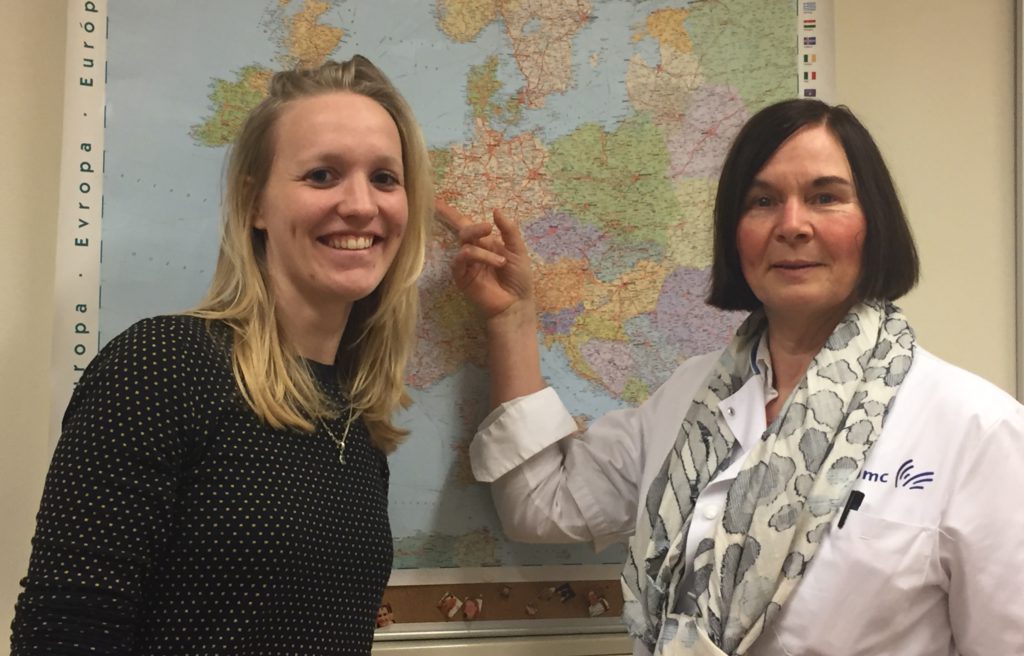
Fibrodysplasia ossificans progressive (FOP) is an extremely rare disease with a prevalence of 1:2,000,000. This autosomal dominant disease is characterized by heterotopic ossification (HO) in connective tissues. HO formation is often preceded by a flare-up: an inflammatory process of a yet unknown origin. Flare-ups may be triggered by traumata (surgery, intramuscular vaccinations, falls) or by (viral) infections (influenza). Over 50% of the flare-ups, however, occur spontaneously. As flare-ups come and go, FOP is a progressive disease resulting in immobility at early age. Flare-ups are known characteristic for FOP, but unfortunately the first feature, malformation of the great toes, is often not linked to FOP but frequently treated with surgery. The intervention, as well as the intramuscular vaccination result in devastating HO formation at the site of trauma. In addition, due to unawareness of the disease among clinicians, invasive diagnostic procedures are used during the diagnostic process, worsening the patient’s disease.
In 2006 the mutation responsible for this disease, was found by the group of Prof E. Shore. The ACVR1-mutation alternates the response of the BMP1 receptor to its ligand: Activin A. Due to this discovery, the pathophysiology has partly been revealed and potential drugs (Palovarotene, Rapamycin, REGN2477 and Saracatinib) have been thought to prevent HO formation after a flare-up. Palovarotene prevents chondrogenesis, whilst REGN2477 prevents the binding of Activin A to the receptor, whereas Rapamycin inhibits mTOR-signalling. At this moment, Palovarotene and REGN2477 are being tested in a clinical trial. A clinical trial (STOP-FOP) with Saracatinib will hopefully start mid-2019.
For the current and coming clinical trials, a tool to measure disease activity is of great importance to evaluate the efficacy of the drug on preventing HO formation. As blood markers are lacking, the Amsterdam UMC has introduced a nuclear scan ([18F]NaF PET/CT-scan) as a promising tool to visualize acute flare-ups For this scan, patients are injected with radioactive sodium fluoride ([18F]NaF) that will bind to newly formed hydroxyapatite. As a result, all sites with active bone turnover and formation can be identified on the gained images. As CT-images are acquired simultaneously, the location of the activity can be accurately identified and bone volume of the active regions can be calculated to evaluate progression (with and without treatment). This technique is currently used as an endpoint in the REGN2477-study and will also be used in the upcoming studies at our center.
Fortunately, science has booked great steps in unravelling this interesting disease. However, many aspects are still poorly understood. For instance, there is a great discrepancy between genotype and phenotype which might suggest interference of other genes and environmental factors. In addition, the pathophysiology of the flare-ups itself is poorly understood. As with FOP, many rare bone diseases are poorly understood and research is of utmost importance to gain insight in these rare diseases in order to develop a safe and effective drug. In addition, knowledge about rare diseases can increase the knowledge about common diseases. The Amsterdam UMC, location VUmc, is an Amsterdam Bone Center specialized in various rare bone diseases including an Expert Center for FOP since 2015 – https://www.vumc.com/branch/fop-amsterdam/.
Patients from various countries visit our centre for advice, follow-up and for participation in clinical trials. Members of the FOP group in Amsterdam are active as editors for the special theme from Frontiers in Endocrinology ‘Innovatives therapies in Bone Biology: What can be learned from rare bone diseases?’
All contributions are welcome!
